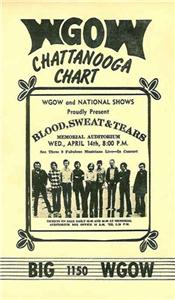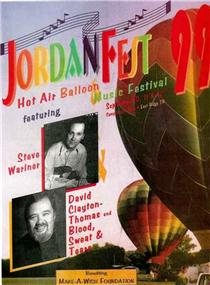
Blood, Sweat & Tears 1971 concert promotion. Click to enlarge.
At the Rock and Roll Music Hall of Fame in Cleveland, Ohio, fans can view memorabilia of over fifty years of music. Each year, the Hall inducts a small group of honorees who have ranged from Elvis to the Beatles to Fleetwood Mac to The Police. Like its baseball counterpart at Cooperstown, there are always some performers who were great but don’t receive enough votes. If I’m ever on the committee, the jazz-rock group Blood, Sweat & Tears would be my pick.
I first heard Blood, Sweat & Tears on the earpiece of my pocket transistor radio during their very commercially successful year of 1969. That year, the album “Blood, Sweat & Tears” hit the stands. I had grown up listening to bands such as the Tijuana Brass and, dare I admit it, Lawrence Welk on Saturday nights. And, of course, it was hard to grow up in the 1960’s and not be a fan of rock music. Blood, Sweat & Tears was comprised of a horn section, guitars, percussion, and a roadhouse blues singer, David Clayton-Thomas. The blend appealed to my varied musical tastes, and gave me a greater inspiration to play trombone in the band. Their horn players hit notes that were a lot cooler than the “Go Tell Aunt Rhody” that we were playing in beginning band.
The album “Blood, Sweat & Tears” contained several selections that received lots of air play. “Spinning Wheel” was written and sung by David Clayton-Thomas, and featured the horn section in various solos and ended with a carousel-style tune. “You’ve Made Me So Very Happy” was an arrangement of a Motown tune. “And When I Die” was a song written by Laura Nyro, who had gained her musical start alongside some of B, S & T in New York’s Greenwich Village. “God Bless the Child” was a cover of a song made popular by Billie Holliday. The album began and ended with an instrumental, “Variations on a Theme by Erik Satie.” With the various complex rhythms and chords in these songs, it was clear to me that I had more to learn as a trombonist than what was going on in “Go Tell Aunt Rhody.”
I soon learned that this was actually the group’s second album. Record stores started carrying the first album after the second turned gold. The first was “Child is Father to the Man,” and was innovative inside and out. On the cover was a photo of the group’s members, each holding a small likeness of himself on his lap like a ventriloquist and his dummy. The line-up of B, S &T was somewhat different than on the second album. The vocalist was Al Kooper instead of David Clayton-Thomas.
“Blood, Sweat & Tears 3” arrived in 1970. This album didn’t have the commercial success as the second one, but was one that I prized. The next year, my high school swing band played an arrangement of “Lucretia MacEvil” that was a favorite of the group. By then, B, S & T faced competition from other jazz-rock groups including Lighthouse, Ides of March, and most of all, Chicago. Our band gave equal time to Chicago by playing “25 or 6 to 4.”
The group performed on the soundtrack of “The Owl and the Pussycat, “a film starring Barbra Streisand, and then released their next album, “B, S & T: 4” in 1971. Dave Bargeron replaced Jerry Hyman as trombonist, and also played tuba on some of the tunes. “Go Down Gambling,” written and sung by David Clayton-Thomas, barely broke the Top 40, though the album was another welcome addition to my Blood, Sweat & Tears collection.
WGOW Radio brought Blood, Sweat & Tears to Chattanooga for a Memorial Auditorium concert in 1971. The show was originally scheduled for Wednesday, April 14th. However, in order to have the concert be on a Friday night (date night), it was rescheduled to April 30th. Charlie Starr, a blues singer, opened the program. I wish that I could tell you what they played, and how they sounded. I guess that I thought that I was too young to go to a concert, and have always regretted not asking to go to this one.
David Clayton-Thomas left Blood, Sweat and Tears at the end of 1971, and started a solo recording career. I recall that his “Magnificent Sanctuary Band” appeared on the WGOW Top 40 weekly ranking of songs. Some other band members departed, including Dick Halligan and Fred Lipsius. Both had played key roles as arrangers as well as musicians on the B, S and T albums.
Jerry Fischer took over as vocalist for Blood, Sweat & Tears in 1972, and the group recorded an album appropriately titled, “New Blood.” The band continued to make TV appearances, such as on the “Midnight Special” show hosted by Wolfman Jack. The group brought in equally talented musicians every time that a vacancy occurred. Lou “Blue Lou” Marini and Tom “Bones” Malone were among them. Both went on to star with John Belushi and Dan Aykroyd in “The Blues Brothers.”
On February 4, 1973, WDXB and the UTC Student Government Association sponsored a concert by Blood, Sweat & Tears. The UTC Echo ran a promotional article for the group in its January 18, 1973 edition. The Echo noted the backgrounds of each musician. Sadly, however, the February 8, 1973 issue of the UTC Echo described the show at the Memorial Auditorium as having been attended by only 1,600 fans. I guess that I missed the advertisements, because I didn’t even know that they were in town!
David Clayton-Thomas rejoined Blood, Sweat & Tears in 1975. The group released an album, “New City, “which included a modest hit of the Beatles’ tune, “Got to Get You Into My Life.” By the late 1970’s, however, musical tastes were changing and B, S & T struggled to achieve commercial success with their later albums.
The group gradually moved onto the “Oldies” circuit, with David Clayton-Thomas being the only member who was around during the Top 40 days. Blood, Sweat & Tears performed at Riverbend in 1987, the year that I finally saw them in concert.
They returned to Chattanooga as part of the September, 1999 “Jordanfest Hot Air Balloon and Music Festival” held at Camp Jordan in East Ridge. The event was more pleasant to me than Riverbend, as it was less crowded and less hot. We were able to sit very close to the stage. Some of the band members looked young enough to have been born in the late 1960’s, when B, S & T was organized. However, they did a fine job of supporting the vocals of David Clayton-Thomas, who sang both the old hits of Blood, Sweat & Tears as well as selections from his solo works.
I’m trying to find someone who attended either the 1971 or 1973 concerts by Blood, Sweat & Tears. I’ve checked extensively, but to no avail. If you attended either concert, or are a fan of B, S & T, please send me an e-mail at jolleyh@signaldata.net.

"Jordanfest 1999" featured David Clayton-Thomas and Blood, Sweat & Tears. Click to enlarge.